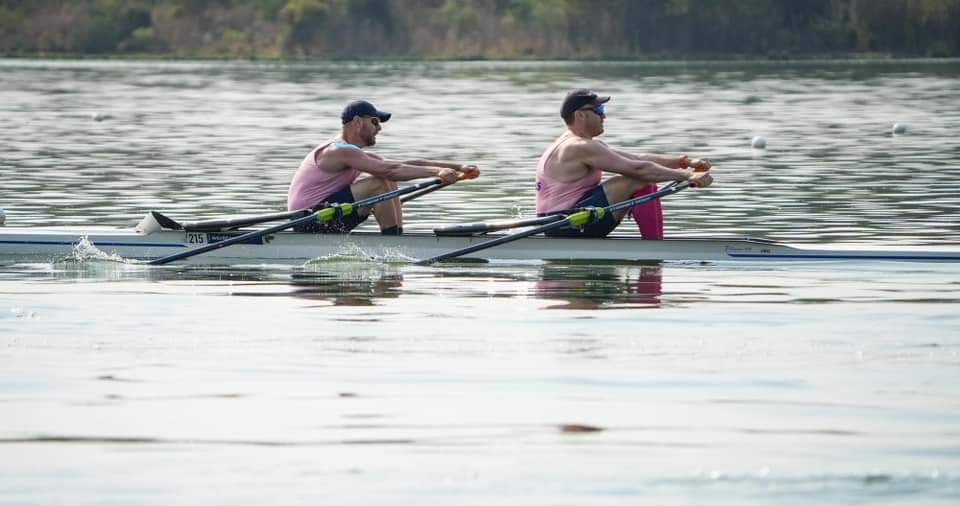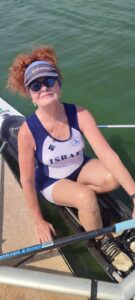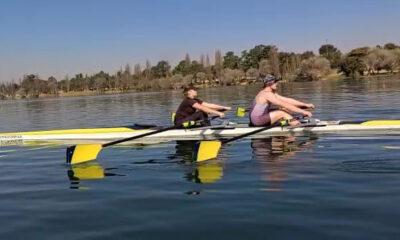
Sport

Israeli athlete conquers turbulence in World Rowing Regatta
Israeli actress and avid rower Razia Israeli felt like she was in the wrong movie at certain times during the World Rowing Masters Regatta at Roodeplaat Dam in Pretoria last month.
Although Israeli, who appeared in several scenes in the movie Schindler’s List, placed in the top three out of about 14 rowers in each of her five races, she endured a few obstacles during the regatta that took place from 21 to 24 September. These included discovering that she had COVID-19, having someone take her boat just when she needed it to race, and almost missing a final.
The first-ever World Rowing event on African water turned out to be more plain sailing for the other Israeli participant, Leonid Hatskin, who won one race and came in the top five in his five other races, which were either single, double, or mixed category races.
Hatskin, who previously participated in regattas in Hungary, Slovenia, and Lithuania, says, “I was happy with winning at least one category but when you race, you always want to win all the races.” His doubles partner was from Australia, and an American rower partnered him for the mixed event.
Israeli, who was asked to carry the Israeli flag at the opening ceremony, did three single races, one quadruple race, and one double race, with her partners being from Ireland, Argentina, and England. “In Israel, there are no women for me to row against, but I have a rowing coach,” says Israeli, who was acting in a movie just before coming to South Africa.

Hatskin and Israeli both speak glowingly of the regatta in Pretoria. “The organisation was of a very high level and above my expectations, even better than you find in Israel,” says Hatskin, who works in the hi-tech industry.
Israeli says the setup allowed people to spend time together overlooking the river before the regatta. “I liked the atmosphere, the drums, and dancing”.
She was shocked by big waves and fierce wind at the start of a race, especially because she’s used to rowing on flat rivers in Tel Aviv. “I was so frightened that my legs were trembling,” she recalls.
During the race, Israeli was thinking, ‘Just breathe, and use all the force of the legs.’ She was concentrating so hard, she continued to row for a further 400m after crossing the finish line. She normally “doesn’t concentrate on anything but rowing. I wasn’t used to the waves and the wind. It was like a survival rowing”, she says.
Ahead of another race, she saw someone taking her boat to use for their race, and although she got it back, it unsettled her so much, she landed up finishing in third place and not second as she had done in her other races. Another time, “when I came back to the hotel, Michelle, who was from the house where I rented the boat, told me that I should go to the final I had qualified for.” I didn’t know there were still going to be a final, so I had gone back to the hotel. I rushed to get back for the final and only three women came instead of eight, so maybe the others also didn’t know.”
She finished second in her last race in spite of by then feeling the effects of having contracted COVID-19, which she thinks she picked up on the flight to South Africa.
Hatskin says rowing isn’t a very popular sport in Israel. “We have three or four professional rowers, and the rest do it as a hobby. Twelve years ago, I was in the national team, and I’m one who prefers training and trains seven times a week, but the majority train a few times a week and just for fun.”
Hatskin took up rowing as a 15-year-old after a rowing coach saw him kayaking and asked if he wanted to give rowing a try. “I fell in love with rowing,” he says.
Israeli, who had the role of Aunt Hanna in Fill the Void, decided to start rowing after seeing rowers in a river while walking with her daughter in Russia.
“I said, ‘Well, it looks so nice.’ I thought that when I went back to Israel, I would tell my partner that we should start learning to row together. I became addicted. I don’t know what happened to me. My soul calls me to row.”






